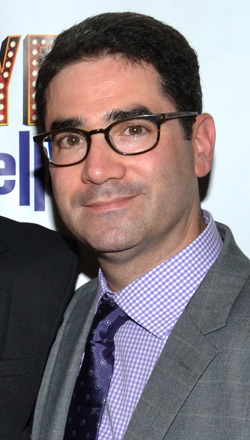The Anti-Defamation League Will Celebrate Its Centennial With Broadway
”Buyer & Cellar” playwright Jonathan Tolins is scripting this special evening honoring ”Fiddler on the Roof” lyricist Sheldon Harnick and the larger Broadway community for its role in advancing tolerance.
On September 17, 1913, Chicago attorney Sigmund Livingston announced the formation of the Anti-Defamation League, a small group operating under the nation’s most prominent Jewish service organization, B’nai B’rith. The stated goal of the ADL was to “Stop the defamation of the Jewish people and to secure justice and fair treatment to all.” Livingston’s announcement came on the heels of the Leo Frank trial, in which a Jewish-American factory superintendent was convicted of murder with very tenuous evidence. Frank was later dragged from his prison cell by a mob and lynched. (Those real-life events are the subject of the Jason Robert Brown-Alfred Uhry musical Parade)
On November 25, the ADL will hold a one-night-only benefit called The Anti-Defamation League & Broadway: Side By Side Against Hate for 100 Years recognizing the historic ties between the struggle for tolerance in America and the theater. Ninety-year-old Fiddler on the Roof lyricist Sheldon Harnick will receive a lifetime achievement award and perform a special duet with Tony Award winner Randy Graff, who played Golde in the most recent Fiddler on the Roof revival.
Playwright Jonathan Tolins is writing the script for the event, which features performances by Carolee Carmello, Robert Cuccioli, Eden Espinosa, and Lillias White, among others. TheaterMania spoke with Tolins about the importance of the ADL and the historic relationship between Broadway and civil rights.

(© David Gordon)
How did you get involved in this benefit?
I was asked by Ted Sperling, who is directing. Ted and I are involved in a show that is in early stages of development for the Public Theater.
Why was it an important project for you?
It made perfect sense to do a Broadway gala for the Anti-Defamation League because so much of the history of the Broadway musical and Broadway play is about exploring issues of human rights, civil rights, and prejudice.
You’ve written for the Tony Awards and Academy Awards before. Is this a similar process?
A little bit. You recognize when you’re writing something like this that you’re there to make things move quickly. You want to be as economical as possible. You have to remember that people talking is not the entertaining part of the show. We give a little bit of the history of the ADL, but my goal is to set up each performance with as much resonance as possible.
One of the people you’re introducing is Sheldon Harnick, who has been around for ninety of the last one hundred years of the ADL. How influential has he been in exposing a wider audience to the Jewish experience?
Oh my God, I don’t think it’s possible to overestimate the influence of Fiddler on the Roof on the consciousness of the world about the Jewish experience and about what makes Jewish people so vivid and entertaining. It’s one of the great perfect musicals. That show has done a tremendous amount to lessen anti-Semitism in the world.
The ADL founded in 1913 with he mission to “stop the defamation of the Jewish people and to secure justice and fair treatment to all…”
Yes. I emphasize that in the gala. It has always been “for all.” The impetus for founding the ADL was to combat the unfair treatment of Jews in the culture, but it was always, even from its first mission statement, about fair treatment for all.
One hundred years later the world is a very different place. New media has opened up new avenues of communication and that include new ways to communicate hate. How has that changed the equation for the ADL?
One of the new programs ADL has is to combat cyber-bullying. I think the organization has stayed true to its mission, but it also stays nimble and faces challenges as they arise. That includes technological changes in the culture. It’s about trying to encourage the best of human nature and discourage the worst. That will never change, whether it’s in a schoolyard or on Facebook.
Is the best way to combat defamation with more words?
Anything that can remind people that they are dealing with other human beings is helpful. I’m gay. The gay rights movement has advanced so quickly because when people know gay people, they’re less likely to be homophobic. Any work that reminds people that the people they are talking about are other human beings, just like they are, offers hope for understanding.
Is that something that the theater can do particularly well?
Absolutely. You can’t really write with that agenda, because you end up with something that is lifeless. Still, the theater gives [individuals] a human experience with people they may not know in their life. It exposes people to the human condition that they may not have considered. That increases understanding and reduces prejudice.
Click below to see a brief history of the ADL, as narrated by James Earl Jones:








